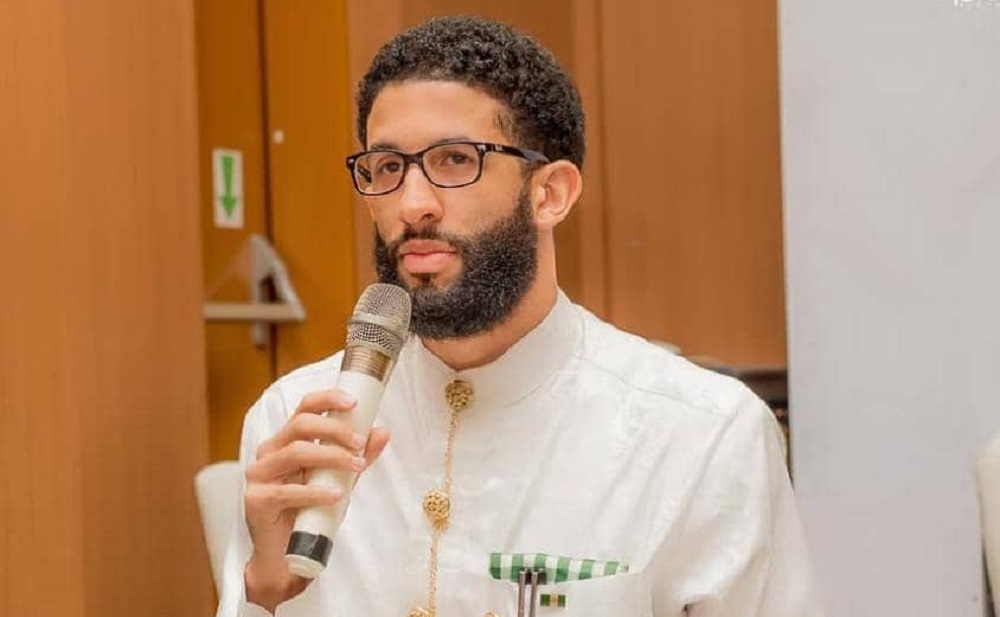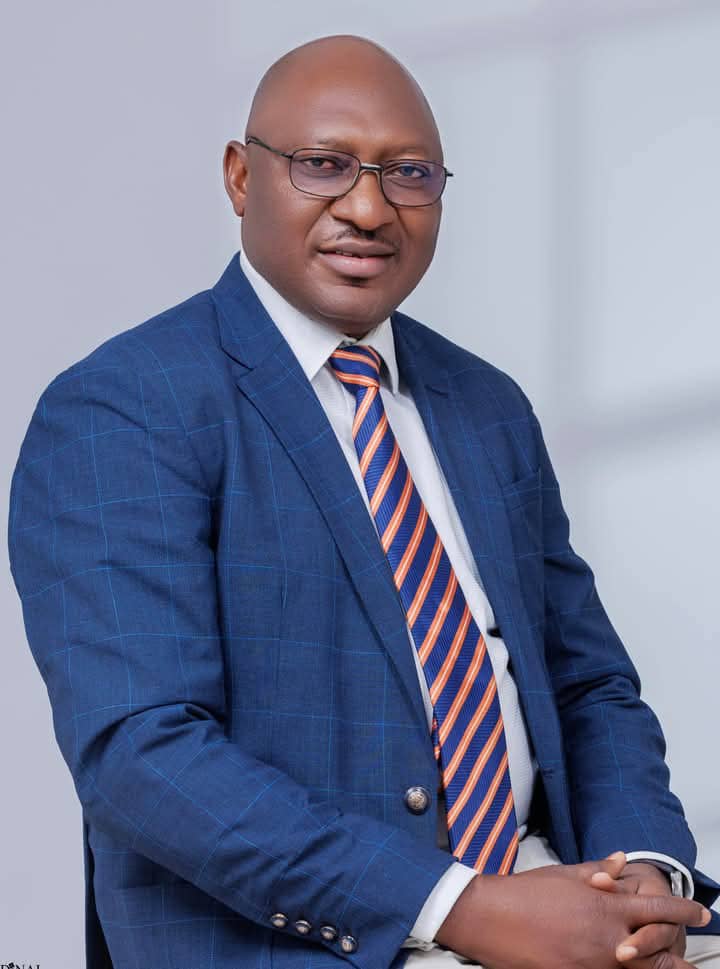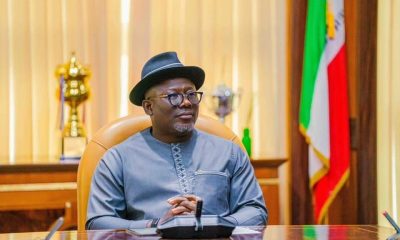Opinion
Can We Let Ajuri Ngelale Be?

By Yinka Adaranijo
Against the backdrop of their roles in the management of media and communications during the campaigns of President Olusegun Obasanjo, a few names were already engraved in the public consciousness who could possibly lead his communication team. Dele Alake, Bayo Onanuga and Tunde Rahman were at the very top of the list. Alake and Onanuga indeed had very long relationships with Tinubu beginning from their years as editors of major newspapers and magazines. They were potent operatives with Tinubu and concerned Nigerians opposed to the better forgotten fistic rule of General Sani Abacha. They were the arrowheads of the “underground press” which reported the despondency of the Nigerian sociopolitical situation to the international community under the famously repressive reign of Abacha.
Alake served as Tinubu’s topmost publicist in the latter’s years as governor of Lagos State. Alake it was who affixed the schedule “strategy” to the primordial brief of information commissioner. This has since been widely adopted by many who barely understand the origins of the initiative. Onanuga was director-general of the News Agency of Nigeria, (NAN), under Buhari, courtesy of Tinubu. Rahman succeeded Sunday Dare who would later serve as sports minister under so Buhari as Tinubu’s media adviser, all the way into Tinubu’s presidential project. All three gentlemen could confidently and confidently stake their curriculum vitae in the quest for the job of presidential spokesperson.
The dynamics of politics is oftentimes unpredictable. For all his good works and professionalism as presidential spokesman during the presidential campaign of Obasanjo in 1998 and 1999, Onyema Ugochukwu, the legendary journalist was tipped undisputably for the job of Obasanjo’s media adviser. In working for Obasanjo, Ugochukwu incurred the wrath of his kinsmen in the Igbo country who thought him a betrayer. Alex Ekwueme a for Vice President was also running for the presidency. Why would Ugochukwu choose to work for a Yoruba aspirant? One of the very first appointments Obasanjo made immediately after his inauguration was that of Doyin Okupe, a medical doctor as his media adviser!
As it turned out, whereas Alake was at the very fore of presidential communication in the early weeks of the Tinubu government, the President’s sights were on Ajuri Ngelale as his media points man. A familiar face on television during his years in the African Independent Television, (AIT) and Channels Television, the young Ngelale had also served in the office of the immediate past Vice President, Yemi Osinbajo, SAN. He is the son of Chief Precious Ngelale, from Rivers State who was Minister of State for Water Resources during Obasanjo’s first term. The President apparently had another crucial brief for Alake to handle, in developing the nation’s solid minerals sector as potential alternative to oil. Petroleum has remained the mainstay of the nation’s economy over several decades. Tinubu had his name on his ministerial shortlist close to his chest. He also had his ideas about how to accommodate and deploy the media human capital resources around him, variously.
Tinubu would subsequently appoint Bayo Onanuga as Special Adviser on Information and Strategy, (remember Alake), and Tunde Rahman as his Senior Special Assistant, (SSA) on media matters. For the purposes of clarification, the Special Adviser and SSA are at par in terms of ranking and entitlements. It was suggested for adoption into the Nigerian presidential organogram in 1999, by former Vice President Atiku Abubakar. Obasanjo filled up the quota of advisers approved for him by the National Assembly. He was still left with substantial numbers of technocrats to integrate into his new government at the advisory level. Atiku came to the rescue with that ingenious suggestion, probably borrowed from the US presidential system.
Tinubu is the first President to operate with a tripod of key media aides. Obasanjo maintained just one in the State House, while other media specialists were assigned different designations. Ugochukwu, was in-charge of the Office of National Orientation and Public Affairs, while the respected Dr Stanley Macebuh (of blessed memory) was SSA Special Duties. Ad’Obe Obe who succeeded Ugochukwu as editor of West Africa magazine in the UK was on the speech writing and foreign affairs schedule, while Tunde Olusunle managed Special Services. All these operatives, however, collaborated with the Media Adviser seamlessly. Buhari adopted a two-pronged system which comprised of Femi Adesina, Special Adviser, and Garba Shehu, SSA, and they complimented each other without glitches.
While the Tinubu administration has brought the Ngelale, Onanuga and Rahman triad together and they collaborate on their assignments, there seem to be ghost agents perennially opposed to Ngelale. From the incident at the United Arab Emirates, (UAE) and the NASDAQ, United States incident last year, to the more recent Maersk incident, certain tendencies seem to be consistently baying for his blood. They seem to detest his youthfulness and self-confidence. They are thus never tired of innuendos and insinuations calculated to undermine his hardwork. Ngelale did not appoint himself to his job, President Tinubu did. And he evidently did so on his convictions even at that time. Those who watched the television shortly after the Supreme Court upheld Tinubu’s election in October last year would probably remember the President’s words when Ngelale visited him in his office. “Ajuri, congratulations. Your job is secure,” was Tinubu’s comment. Ngelale had been with Tinubu for just a few months and was convinced enough by Ngelale’s services that he reassured him of his retention on his desk.
Sources in Aso Villa will tell you that beyond packaging and managing the public perception of the President, Ngelale also functions as master of ceremonies for events held in that complex. Elsewhere and at other times, this in itself is a full portfolio at the pedestal of an adviser. The daily schedule of the President as articulated by the Department of Protocol in conjunction with the Chief of Staff, (COS), should be served to the official manning this outpost regularly. His work could indeed involve some research work to keep the compere updated about what to say in specific terms, displaying situational and spatial awareness. Just in case the President was receiving in audience say Anthony Blinken the US Secretary of State, introducing the dignitary and situating the context of his visit are beyond spontaneous conjuration.
Beyond rhetoric, Tinubu is conscientiously committed to grooming the younger generation to become leaders of the future. The likes of Betta Edu, the ostensibly 37 year-old medical doctor who was entrusted with the crucial Ministry of Humanitarian Affairs and Poverty Alleviation might have failed the President. His faith in the younger generation, however, as baton-collectors from the older dispensation remains unshaken. This explains his entrusting the National Agency for Science and Engineering Infrastructure, (NASENI), the 33 year old Khalil Halilu as Executive Vice Chairman and Chief Executive, and the 38 year-old Jamila Bio-Ibrahim as Minister for Youth Affairs. Ngelale is 37 and fits the profile Tinubu wants to groom for the future.
Yinka Adaranijo a renowned journalist and seasoned public affairs analyst, writes from Lagos
Opinion
CBN leads financial dialogue with JP Morgan, NGX, others, in pre-spring meetings Forum

By Dr. Ibrahim Modibbo
In anticipation of the International Monetary Fund (IMF) and World Bank Group (WBG) Spring meetings which commenced on Monday, April 21, 2025, the Central Bank of Nigeria (CBN) partnered with J.P. Morgan, the Nigerian Exchange Group (NGX) and Africa Private Capital Association (AVCA) to host a high-profile global forum at Nasdaq MarketSite in New York on Thursday, April 17, 2025, according to press statement by Dr Ibrahim Moddibo.
The forum, titled “The Nigeria Investment Agenda: Pathways for Growth & Global Partnerships,” convened global investors, diaspora leaders, and senior financial stakeholders to examine Nigeria’s macroeconomic prospects and ongoing reform progress.During his commanding address, Governor Olayemi Cardoso outlined his comprehensive reform strategy encompassing monetary tightening, foreign exchange market transparency, and enhanced financial governance.
He emphasized that these initiatives are establishing the foundation for sustainable macroeconomic stability and heralding a new era of transparency and confidence.Governor Cardoso reaffirmed the CBN’s unwavering commitment to rebuilding credibility through orthodox monetary policy, transparency, and consistency.
“We inherited a crisis of confidence but chose a different path. We’re not turning back,” he stated decisively.In a powerful fireside chat between the Governor and Nobel Prize-winning economist Dr. James Robinson, Reverend Richard L. Pearson Professor at the University of Chicago, Governor Cardoso elaborated on his vision to reestablish the CBN as a credible, trusted institution – rooted in domestic excellence and respected internationally.Mr. Muhammad Sani Abdullahi, Deputy Governor for Economic Policy at the CBN, delivered a macroeconomic update highlighting sharp increases in foreign exchange turnover, emerging signs of disinflation, and strengthening external reserves. “With a market-determined exchange rate and a transparent, rules-based policy framework, confidence is gradually being restored in Nigeria’s economy,” he noted.
Welcoming participants to the forum, Dr. Nkiru Balonwu, Adviser to the CBN Governor on Stakeholder Engagement and Strategic Communication, framed the forum as a key moment in the Bank’s broader engagement strategy. “Today is more than a conversation,” she noted.
It’s about opening the books on the CBN’s transformation story under Governor Cardoso – sharing the facts, interrogating the progress, and looking ahead together at what more can be done to build sustainable partnerships and unlock long-term capital,” she explained.
Another key highlight of the event was the panel discussion entitled “Repricing Nigeria: Assessing the Scope for Sustained Change.” Moderated by Gavin Serkin, Founder of New Markets Media & Intelligence, the panel featured global financial luminaries: Joyce Chang, Chair of Global Research at JPMorgan Chase; Jason Rekate, Global Co-Head of Corporate Banking at Citi; Razia Khan, Chief Economist for Africa & Middle East at Standard Chartered; and Ahmad Zuaiter, Co-Founder & CIO of Jadara Capital Partners. Each panelist provided expert perspectives on Nigeria’s investment landscape, noting renewed international interest driven by improved fundamentals, strengthened governance, and clearer policy direction.
The CBN Board and Monetary Policy Committee were represented by US-based diaspora members Mr. Robert Agbede, Prof. Melvin Ayogu, and Dr. Aloysius Ordu, underscoring the Bank’s global engagement and commitment to leveraging Nigerian talent worldwide. Temi Popoola, Group CEO of NGX, moderated the Q&A session, while Dr. Olubukola Akinniyi Akinwunmi, Director of Banking Supervision at CBN, delivered the closing remarks.The forum focused on substantive discussions and future prospects: engaging critical voices, evaluating progress, and identifying requirements for building lasting partnerships and attracting long-term capital. Central to this endeavor is a clear objective: reestablishing the CBN as a credible, trusted institution respected globally and dedicated to excellence at home.
Dr. Ibrahim Modibbo, a public affairs analyst writes from Abuja.
Opinion
Instagram , WhatsApp troubled by antitrust laws

By Sonny Aragba-Akpore
While we are yet to grapple with the fate of Tik Tok which President Donald Trump had asked its parent company Byte Dance of China to divest from it’s American operations or be banned, Meta Group, owners of Instagram and WhatsApp, is troubled over antitrust concerns.
The U.S. Federal Trade Commission (FTC) has taken the group to court over anti competition issues.
Specifically, the FTC wants Meta to divest from its two biggest companies in an antitrust trial that could redefine the future of social media.
And so Meta’s world is troubled as Mark Zuckerberg’s company could be forced to sell Instagram and WhatsApp if it loses the lawsuit that has just begun in the U.S.
The FTC has accused Zuckerberg’s company of having bought both platforms to eliminate competition and maintain a monopoly on social media.
If the court rules against them, it would be a historic blow to the tech giant.
Zuckerberg acquired Instagram in 2012, and then, two years later,(2014) completed his trio by buying WhatsApp.
Facebook is the third leg of the trio and this easily makes the group the largest tech owner in the world.
Although these acquisitions were approved by the FTC itself at that time ,but now this lawsuit seeks to reverse that approval, arguing that the purchase was not for innovation but to “neutralize” emerging rivals like Instagram which was acquired in 2012 and thus take control of the entire market.
The FTC claims that Meta has used its financial muscle to block competition, buying up emerging apps instead of competing with them, and it has been doing this since 2008! Everything is based on 2012 emails where Zuckerberg had expressed concern about Instagram’s rapid growth compared to Facebook’s performance (which was his only app at the time). In those emails, Zuckerberg admitted it was better to buy than to compete. And so he did, acquiring the app years later.
“On the other hand, he also bought WhatsApp, and of course that reinforces the FTC’s accusation. Meta strengthened its control over the digital system, keeping these apps as separate platforms but under the same power structure” analysts reason.
Meta has not denied the purchases, even though it rejects having acted in an anti-competitive way, calling the case a “weak lawsuit that ignores reality,” since they believe they face strong competition from platforms like TikTok, YouTube or X among many other apps.
During the trial, Zuckerberg claimed he bought Instagram for its camera technology, not because the social network was on the rise, but the 2012 messages don’t seem to support that statement very well.
In the likelihood that FTC wins this case, Meta could be forced to sell Instagram, WhatsApp, or both. This wouldn’t necessarily mean an immediate change for users, but it would shift the balance in the digital market, according to experts.
Digital sociologists think that Meta would make it easier to regulate social networks individually by the FTC.
One of the major implications will be on things like content moderation, privacy, or the use of personal data.
“If it gets split, it would be easier for lawmakers, ensuring proper service to users” digital sociologists admit.
There are however fears of who buys if it gets to that .
For instance If a controversial figure like Elon Musk or an investment fund takes control of Instagram, like what happened with Twitter (now X), it’s possible that many users would leave in large numbers for new alternatives that may emerge, like BlueSky.
“But if it falls into the hands of a discreet company, without major visible changes, it’s likely that most people will keep using it as they always have.”
Although Meta does not reveal exactly how much it earns from each app, it is estimated that Instagram generates around $37 million a year, surpassing Facebook’s revenue according to analysts.
“So of course, Zuckerberg’s eagerness to get out of this case is clear: they can’t afford to lose that income because it would be a catastrophe for Meta” another analyst submits.
The expectations are dicey because the court’s decision will not only affect Meta, but could also open the door to more lawsuits against other big platforms for similar monopoly practices. And at a time when the control of social networks is more questioned than ever, this case could define the future of the digital system in terms of free choice and regulations.
Instagram and WhatsApp which were acquired over a decade ago have become social powerhouses and easily the biggest platforms in that genre.
This looming antitrust trial will be the first big test of President Trump’s Federal Trade Commission’s ability to challenge Big Tech.
The lawsuit was first filed against Meta — then called Facebook — in 2020, during Trump’s first term. It claims the company bought Instagram and WhatsApp to squash competition and establish an illegal monopoly in the social media market.
FTC contends that Meta has maintained a monopoly by pursuing CEO Zuckerberg’s strategy, “expressed in 2008: ‘It is better to buy than compete.’ True to that maxim, Facebook has systematically tracked potential rivals and acquired companies that it viewed as serious competitive threats.”
U.S. antitrust laws are enforced by both the FTC’s Bureau of Competition and the Antitrust Division of the Department of Justice. The agencies consult before opening any investigation. The Antitrust Division handles all criminal antitrust enforcement.
The FTC,s Bureau of Competition enforces the nation’s antitrust laws, which form the foundation of a free market economy.
The antitrust laws promote the interests of consumers; they support unfettered markets and result in lower prices and more choices.
The Federal Trade Commission Act and the Clayton Act, both passed by Congress in 1914, give the Commission authority to enforce the antitrust laws.
These laws prohibit anticompetitive mergers and business practices that seek to prevent hard-driving competition, such as monopolistic conduct, attempts to monopolize, and conspiracies in restraint of trade.
The Bureau of Competition investigates potential law violations and seeks legal remedies in federal court or before the FTC’s administrative law judges. The Bureau also serves as a resource for policy makers on competition issues, and works closely with foreign competition agencies to promote sound and consistent outcomes in the international arena.
WhatsApp (officially WhatsApp Messenger) is an American social media, instant messaging (IM), and voice-over-IP (VoIP) service owned by technology conglomerate Meta. It allows users to send text, voice messages and video messages, make voice and video calls, and share images, documents, user locations, and other content.
WhatsApp’s client application runs on mobile devices, and can be accessed from computers.
The service requires a cellular mobile telephone number to sign up.
In January 2018, WhatsApp released a standalone business app called WhatsApp Business which can communicate with the standard WhatsApp client.
The service was created by WhatsApp Inc. of Mountain View, California, which was acquired by Facebook in February 2014 for approximately US$19.3 billion.
It became the world’s most popular messaging application by 2015,and had more than two billion users worldwide by February 2020,confirmed four years later by 200 million new registrations per month.
By 2016, it had become the primary means of Internet communication in regions including the Americas, the Indian subcontinent, and large parts of Europe and Africa.
Instagram is an American photo and short-form video sharing social networking service owned by Meta Platforms. It allows users to upload media that can be edited with filters, be organized by hashtags, and be associated with a location via geographical tagging.
Posts can be shared publicly or with preapproved followers. Users can browse other users’ content by tags and locations, view trending content, like photos, and follow other users to add their content to a personal feed.
A Meta-operated image-centric social media platform, it is available on iOS, Android, Windows 10, and the web. Users can take photos and edit them using built-in filters and other tools, then share them on other social media platforms like Facebook.
It supports 32 languages including English, Hindi, Spanish, French, Korean, and Japanese.
Instagram was originally distinguished by allowing content to be framed only in a square aspect ratio of 640 pixels to match the display width of the iPhone at the time.
In 2015, this restriction was eased with an increase to 1080 pixels. It also added messaging features, the ability to include multiple images or videos in a single post, and a Stories feature—similar to its main competitor, Snapchat, which allowed users to post their content to a sequential feed, with each post accessible to others for 24 hours.
As of January 2019, Stories were used by 500 million people daily.
Instagram was launched for iOS in October 2010 by Kevin Systrom and Mike Krieger. It rapidly gained popularity, reaching one million registered users in two months, 10 million in a year, and one billion in June 2018.
In April 2012, Facebook acquired the service for approximately US$1 billion in cash and stock. The Android version of Instagram was released in April 2012, followed by a feature-limited desktop interface in November 2012, a Fire OS app in June 2014, and an app for Windows 10 in October 2016.
Although often admired for its success and influence, Instagram has also been criticized for negatively affecting teens’ mental health, its policy and interface changes, its alleged censorship, and illegal and inappropriate content uploaded by users.
Opinion
Hon. Prof Nnamchi’s Low Social Media Presence Doesn’t Define His Output- A Reply To X User’s Observation

By Titus Agbo
A user on X, formerly Twitter, named Mechelito@Onyema_7, claimed that Hon. Professor Paul Sunday Nnamchi, the member representing of Enugu East/Isi Uzo Federal Constituency in the House of Representatives doesn’t post about the insecurity issues in Eha-Amufu and his efforts to impact his constituents on his X handle, @sunday_nnamchi. The user supported his claim with a screenshot of Nnamchi’s X account page.
However, it’s worth noting that Professor Nnamchi’s low online presence doesn’t necessarily reflect his efforts and output. He was raised by Catholic priests and has a humble disposition. Before venturing into politics, he was involved in humanism, providing free computer training to students in his local government area, Enugu East. This initiative, which aims to expose students to information and communication technology (ICT) education, has trained over 2,000 students as he has since expanded it to accommodate his constituents from Isi Uzo immediately he was elected into the National Assembly.
# Key Achievements
-Scholarships*: Nnamchi has offered scholarships to hundreds of indigent students from various communities within the constituency, including non-indigenes residing in Enugu East/Isi Uzo. Sewed school uniforms for pupils in primary schools and facilitated employments for a few constituents.
– *Infrastructure Development*: He deployed ₦300 million worth of solar-powered streetlights to communities in Enugu East Local Government Area last year and plans to replicate same in Isi Uzo this 2025.
– *Education and Healthcare*: Nnamchi has built and renovated classroom blocks, provided medical outreach programs, and offered free medical treatments and medications to constituents who couldn’t afford them.
– *Security*: He raised a motion on the Eha-Amufu killings on the floor of the House of Representatives on the 19th December, 2023 prompting the House to urge the Inspector-General of Police and the Chief of Army Staff to deploy adequate security personnel to Eha-Amufu and also directed the National Emergency Management Agency, (NEMA) to provide relief materials to the affected victims.
Professor Nnamchi also issued a strongly worded press statement in December 2024 reminding the relevant security agencies of the need to step up their operations in Eha-Amufu. The motion and the subsequent press statement issued the following year when the hoodlums struck again in 2024 were widely reported by both online and major newspapers as can be observed with a few examples of the publications below.
– “Lawmakers Seek Urgent Action To Address Insecurity In Enugu State” by Gloria Essien, Abuja (Voice of Nigeria online, December 4, 2024)
– “Enugu attacks: Reps urge FG to intensify efforts against insecurity in S/E” (Vanguard Newspaper, December 4, 2024)
– “Task FG to address insecurity in South East” by Ndubisi Orji (Sun Newspaper, December 5, 2024).
Nnamchi has sponsored 36 establishment and amendment Bills and numerous motions as at March 2025. The Order Paper, an authoritative in-house journal of the National Assembly, adjudged him the most performing legislator from the Southeast in 2024 ¹.
I want to assure the above X user that all Hon Professor Nnamchi’s social media accounts will be put into proper use henceforth to keep constituents like him updated with Professor Nnamchi’s legislative and constituency engagements.
Titus Agbo, a public affairs analyst wrote from Enugu
-

 News17 hours ago
News17 hours agoBREAKING! Gov Oborevwori finally dumps PDP
-

 News19 hours ago
News19 hours ago18 Africans among cardinals to elect new Pope
-

 News19 hours ago
News19 hours agoLagos school owner nabbed for concealing r3pe of eleven girls by teacher
-

 News13 hours ago
News13 hours agoDelta to transform into complete APC state as 25 PDP Local Government Chairmen set to defect
-

 News19 hours ago
News19 hours agoPilgrims Arrive As Lying In State Begins for Pope Francis
-

 News20 hours ago
News20 hours agoCustoms Generates N1.7trn Revenue, Seizes N7.6bn Goods in Q1
-

 News20 hours ago
News20 hours agoNigeria’s rebased inflation to hit 37% in 2026 – IMF
-

 News20 hours ago
News20 hours agoIndia offers Nigerians 250 fully-funded scholarships






